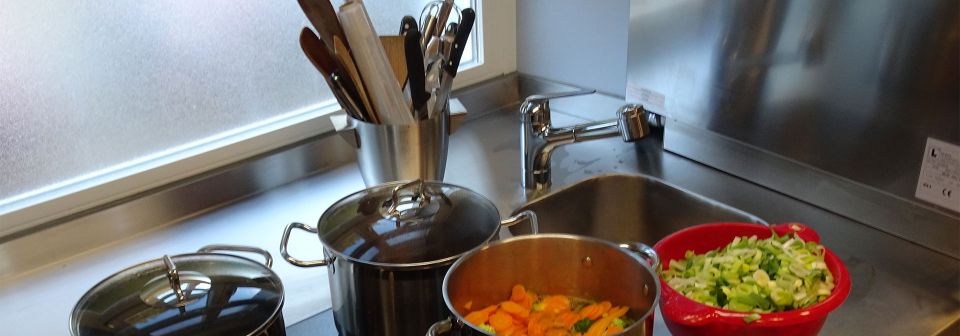Kitchen hygiene rules

Kitchen hygiene rules
The board of directors and the management of the St. Leonhard Day-care Centre are responsible for ensuring that hygiene is guaranteed at all times. Cantonal hygiene inspections are carried out annually by the Hygiene Inspectorate. This is used to establish a hygiene management system with responsibilities for quality development and quality assurance for the St. Leonhard Day-care Centre. One or more persons responsible for hygiene management are appointed as required.
- A member of the day-care centre management is the direct supervisor, according to the organisation chart, of the kitchen staff and trains/instructs the responsible persons.
- The hygiene plan is to be hung prominently in the kitchen. It must be signed by the person who carries out the kitchen inspection, which is regularly checked by the day-care centre management. The plan will be reviewed and adapted to the current situation if necessary.
- The hygiene plan must be filed weekly in the Kitchen Hygiene folder.
1. Basic hygiene
The rooms and equipment of the new kitchen comply with laws, regulations and standards (an industrial kitchen was installed in 2016 and is in operation). Continuous structural maintenance and renovation is the necessary prerequisite for any effective cleaning and disinfection.
2. Staff hygiene in the kitchen
- Clean, tidy appearance
- Well-groomed hands
- Short and unvarnished fingernails, no artificial nails
- No jewellery or wrist watches on the hands and forearms
- Long hair must be tied up
- Clean kitchen shoes with rubber soles (e.g. Crocs)
- Sick employees are not permitted to enter the kitchen
- The opening and closing times of the kitchen must be observed at all times
3. Hand hygiene
According to the principles of the FOPH (Federal Office of Public Health), these must be fulfilled at all times (see also Seifenboss, https://www.coronavirus.bs.ch/Aktuelle-Situation/so-schuetzen-wir-uns/seifenboss.html ). There is a hand disinfectant dispenser, skin-friendly washing lotion and disposable towels (paper towel dispenser) in the kitchen. Before any activity in the kitchen, hands must be washed and disinfected accordingly. This also applies when the kitchen is left for a short time in-between times.
4. Kitchen hygiene from Monday to Friday
4.1 Kitchen opening and closing times
The kitchen is closed for all employees, children and parents from 9.30 am to 3 pm; the kitchen door is to be kept closed during this time. Outside these times, access to the kitchen is defined and specified below. The only exception is for the collection of food and the return of crockery from the lunch table.
The cooking staff is present daily from 8 am to 4.30 pm. Staff are responsible for the preparation of food and compliance with all relevant hygiene regulations in the kitchen.
4.2 Schedule for early shift/breakfast 6.30 to 8 am
- The assigned person is responsible for breakfast
- The serving trolleys are stationed at a fixed location in the group rooms
- The breakfast crockery is deposited on these (groups: Rainbow, Stars and Clouds)
- From 8.30 am the dishes are brought into the kitchen by the assigned person, washed and then the person deposits the dishes on the serving trolleys and pushes them into the respective group rooms
- The groups take care of the dishes by 09.00 am at the latest
- The assigned person checks the dishwasher (refilling the dishwasher and cleaning the individual items – the cooking staff instructs the respective employees)
- The floor and surfaces must be cleaned and handed over to the cooking staff
Summary: In the Stars and Rainbow group rooms, there is a serving trolley in each room, the dirty dishes are deposited on these and any food leftovers on the plates are scraped off by the group employees into the buckets on the serving trolley. Lunch is served from 11.45 am to 1.30 pm. The groups bring their lunch to the group rooms in the bowls provided.
4.3 Lunch schedule (preparation)
- The cook or deputy cook collects the dirty dishes from the groups on the serving trolleys
- The food leftovers are disposed of, the serving trolley is cleaned
- The dishes are washed and stacked back on the serving trolley
- The serving trolleys are then pushed into the group rooms by the cook
- Crockery will be properly taken care of by the groups by 2 pm at the latest
- The cook looks after his own kitchen utensils, dishes etc. in the kitchen
- He then cleans the kitchen (floor, surfaces and all utensils such as pans and ovens, utensils for everyday use, etc.)
4.4 Lunch schedule (serving)
- Lunch is served alternately by all employees (weekly schedule)
- The lunchtime staff bring the used dishes back to the kitchen
- The dishes are washed by the cooking staff and deposited in the kitchen
- The lunchtime staff will pick them up in the kitchen and put them away properly in the cellar, by 3 pm at the latest
4.5 Afternoon snack schedule from 3.30 pm
- Each group follows the breakfast procedure
- The dishes are to be deposited on the serving trolley and the responsible staff members and/or employees wash the dishes
- The serving trolleys are pushed into the groups and the groups take care of their own crockery on the same day
- Baby bottles plus teats/dummies are ready for washing in the kitchen by 4 pm. Important – the bottles must be placed horizontally into the dishwasher! The employees of the Clouds group (baby group) are to pick up their dishes again by 6 pm at the latest.
- The employees who make the afternoon snack also check the dishwasher, refill and clean all individual items
- The floor and all surfaces in the kitchen must be cleaned
- The waste bag should be placed in the containers provided in the garden every evening
The daily kitchen check is carried out by a qualified childcare worker and/or late-shift employee no later than 5.30 pm
4.6 The work to be done at the kitchen inspection are (plan is hanging in the kitchen)
- Check the refrigerator and refrigerated drawers and clean and dry them if necessary
- All opened food in the refrigerator must be marked with date and stored in containers/Tupperware
- The surfaces and the floor must be checked, cleaned and dried if necessary
- The sinks must be cleaned and dried
- Fruit peels and open vegetables must be checked, rotten fruit/vegetables must be disposed of
5. Conclusion
The implementation and fulfilment of the hygiene standard is an important concern of the board and the day-care centre management. Avoid spending unnecessary time in the kitchen hygiene area.
May 2020

Contact
© 2017-2026 Tagesheim St. Leonhard


